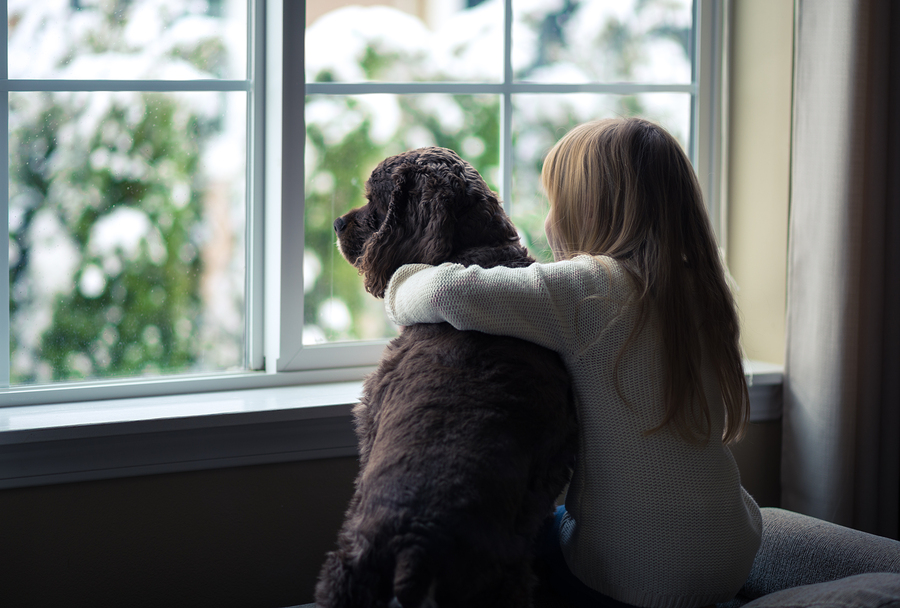
This post may contain affiliate links. We are compensated for referring customers to our affiliate partners.
The seasonal change from summer to winter can also impact your dog’s health. In the winter dogs are less active than in the Spring, Summer, and Fall, so you may want to make some adjustments to their diet to help support a healthy weight through the winter months. Here are ten winter feeding tips for dogs to help them stay healthy in the coldest months of the year.
- Watch The Treats: During the winter months, we all tend to overindulge. With all of the holiday meals, you may be tempted to also feed your dog extra treats. A little of the Thanksgiving turkey, some of the Christmas ham or Hanukkah brisket can seem harmless but can really pack on the calories. So make sure that through the winter holidays you keep your dog on their normal feeding routine.
- Careful With Holiday Toxins: There are many foods that are around during the holidays that can be toxic for dogs. Avoiding feeding your dog chocolates, macadamia nuts, and yeast doughs because these things can make them very sick. If you decide to give your dog human foods during the holidays make sure it is something they can eat like meat, sweet potatoes, or green beans. Also watch them around poinsettias, holly, and mistletoe because they may also make them sick.
- Manage Their Caloric Intake: The amount of calories your dog consumes during the winter depends entirely on your dog. Some dogs will need extra calories in the winter so they can support the extra energy they need to fight the cold, while other dogs become less active so they need less calories or they may gain weight. In either case, feed your dog their normal amount and watch their weight. If they begin losing weight, you may need to increase the calories. If they begin gaining weight, you may need to cut the calories back until the weather warms up again.
- Find Creative Ways To Exercise: Rather than cutting your dog’s calories, you might want to look at better ways for them to exercise during the winter if they are prone to weight gain. Maybe play some indoor games or take them to doggy daycare a couple times a week so they can run around with other dogs inside. Exercise goes hand in hand with nutrition, so don’t forget this important aspect of doggy care.
- Support Their Joints: During the winter the cold, dry weather can do a number on your dog’s joints. If you dog is older or is prone to arthritis or hip dysplasia, you’ll want to add some supplements for joint health. Glucosamine and chondroitin are great for joint support as are omega fatty acids. You can look for foods that contain high amounts of these ingredients or get a dietary supplement to add to their normal feeding schedule.
- Pay Attention To Coat Health: During the winter, the only thing protecting your dog from the blistering cold is their coat. A dog’s coat can be negatively impacted by their food. If they have food allergies or intolerances, their coats can become thin and dry. If your dog’s coat isn’t healthy and shiny, you may want to take them to the veterinarian for an allergy test. You can also switch to a coat healthy dog formula or add a supplement like Zesty Paws Omega Bites or PetHonesty Omega Salmon to their diet.
- Pay Attention To Skin Health: Skin health is crucial during the winter, because dry cracked skin can get worse in the cold winter weather. You also want to make sure their paws are healthy because as they walk on the snow and ice, they need extra protection against freezing feet. If they have any cracked or chapped skin, you will need to see a veterinarian to diagnose the cause and find a good treatment. You can also help maintain your dog’s skin health with a food that contains a lot of omega fatty acids.
- Keep Your Dog Hydrated: Winter is usually very dry, so your dog is at a greater risk of dehydration. Make sure you always keep out a water bowl during the winter so they can stay hydrated. If you keep your dog outside during the cold months, make sure their water bowl doesn’t freeze over.
- Keep An Eye Out For Depression: Dogs can be affected by seasonal depression just like humans. They usually get less exercise and see less sun during the winter, so they may end up feeling depressed. If your dog suddenly has low energy, is lethargic, or shows a lack of interest in normal games, you should talk to your veterinarian. You also want to make sure that your dog food has a good variety of B vitamins to help keep their spirits up.
- Support Their Immune System: Dogs, like humans are more susceptible to getting colds during the winter. So make sure you also bolster their immune system with antioxidants. High quality dog foods usually have a good nutritional profile, if your dog’s food does not consider switching them to a food like Orijen or adding an antioxidant supplement to their diet to help bolster against colds.
Your dog’s nutritional needs change during the winter. Those all of these tips are good to consider year-round, you want to pay special attention to them during the wintertime. The cold dry air, lack of exercise, and reduced sunlight can cause some very specific health issues, so you want to do everything you can to keep your dog healthy during this time of year. Also, if you decide to switch their food, make sure that you follow our guide to introducing your dog to a new food so that you don’t trigger any avoidable digestive issues. We hope these winter feeding tips for dogs was useful and stay warm out there!
